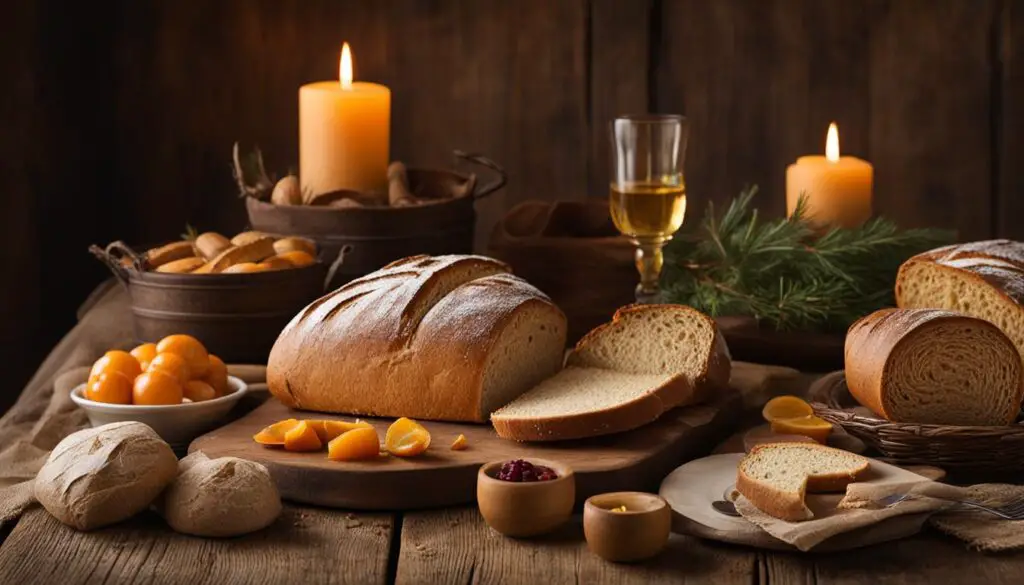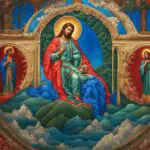Bread holds deep meaning in the Bible, symbolizing nourishment, provision, sustenance, and the abundant life. It is often associated with concepts like manna, daily bread, and the communion of sharing a feast together. Understanding the symbolism of bread in biblical narratives offers a profound insight into the spiritual significance associated with this staple food.
Key Takeaways:
- Bread symbolizes nourishment, provision, sustenance, and the abundant life in the Bible.
- It is associated with manna, daily bread, and the communion of sharing a feast.
- Understanding the symbolism of bread offers profound insights into spiritual significance.
- Bread represents unity, hospitality, and generosity.
- Jesus is referred to as the Bread of Life, offering eternal nourishment.
The Threefold Purpose of Bread in the Bible
Bread served a threefold purpose in the Bible. Firstly, it represented the basic food that supported life in the Old Testament. Secondly, it symbolized the relationship between God and the Israelites, and later Jesus and His followers. Sharing bread at meals was an act of unity among believers. Lastly, bread played a significant role in the commemoration of the sacrifice of Jesus in the sacrament of communion.
The Role of Bread as Basic Food
In the Old Testament, bread was a staple food that provided sustenance for the Israelites. It was a vital part of their daily diet, often made from wheat or barley. The act of baking and eating bread was essential for survival, and it represented God’s provision for His people. The Israelites relied on bread as their main source of nourishment and sustenance.
Bread as a Symbol of Unity
In biblical narratives, sharing bread at meals was not only about physical nourishment but also represented a deep bond among believers. In the Old Testament, it symbolized the relationship between God and the Israelites, as they communed with Him during feasts and offerings. Later, Jesus continued this tradition by breaking bread with His disciples during the Last Supper, establishing a new covenant. This act of sharing bread served to unite believers in their faith and signify their connection to God.
Commemorating Jesus’ Sacrifice through Bread
Bread also played a crucial role in the sacrament of communion, which commemorates the sacrifice of Jesus on the cross. During the Last Supper, Jesus broke bread and shared it with His disciples, instructing them to do the same in remembrance of Him. The bread served in communion represents the body of Jesus, broken for the forgiveness of sins. It is a powerful symbol of His sacrifice and a means for believers to connect with His presence and redemptive work.
| Aspect of Bread | Meaning in the Bible |
|---|---|
| Basic Food | Represents God’s provision and sustenance for His people |
| Symbol of Unity | Signifies the relationship between believers, God, and Jesus |
| Communion | Commemorates Jesus’ sacrifice and connects believers to His presence |
Bread and Hospitality
Bread has a long history of symbolizing hospitality in various cultures and holds a significant place in biblical narratives. In the Bible, bread is closely connected to the concept of welcoming and generosity. It represents the act of sharing and signifies the host’s welcoming and generous spirit. Hospitality goes beyond providing food; it involves spending quality time with others, sharing conversations, and showing kindness to strangers.
In the book of Genesis, we see the patriarch Abraham offering bread as a sign of hospitality to his guests. This act of sharing bread demonstrated his generous and welcoming nature. It set the tone for the entire meal and created a sense of unity and fellowship among those gathered. The act of breaking bread together fostered not only physical nourishment but also a deeper connection between individuals.
“He took some curds and milk and the calf that had been prepared, and set these before them. While they ate, he stood near them under a tree.” – Genesis 18:8
Sharing bread is an expression of love and care. It is a tangible way to show generosity and provide for the needs of others. In biblical times, offering bread to someone was a symbol of acceptance and an invitation to be a part of the community. It represented the willingness to share resources and provide for one another.

The Symbolism of Bread
| Biblical Reference | Meaning |
|---|---|
| Genesis 18:8 | Abraham’s hospitality and generosity |
| Exodus 16:4 | God’s provision of manna in the wilderness |
| Matthew 14:19 | Miraculous feeding of the five thousand |
| John 6:35 | Jesus as the Bread of Life |
- Bread symbolizes welcoming and generosity.
- Sharing bread fosters unity and fellowship.
- Offering bread signifies acceptance and an invitation to be a part of the community.
- Bread represents the act of sharing resources and providing for the needs of others.
Understanding the symbolism of bread in biblical narratives deepens our appreciation for its role in hospitality. It reminds us of the importance of welcoming others, sharing our resources, and extending generosity to those around us.
Manna and the Bread of Presence
The Israelites experienced the miraculous provision of manna in the wilderness, a bread from heaven that sustained them during their journey. It was a divine sign of God’s continual presence and His faithful provision for their physical needs. The manna appeared each morning, like dew on the ground, and the Israelites gathered it to make their daily bread. This extraordinary provision of bread served as a tangible reminder of their reliance on God and His faithfulness to them.
Furthermore, in the tabernacle and later in the temple, there was a sacred bread on the altar known as the Bread of Presence. It consisted of 12 loaves placed on a table in the holy place, symbolizing the 12 tribes of Israel. The bread was replaced weekly, and the priests ate the bread that was removed. This tradition highlighted God’s abiding presence among His people and the importance of His sustenance in their lives.
“And you shall set the bread of the Presence on the table before me regularly.” – Exodus 25:30
Both the manna and the Bread of Presence emphasized the significance of bread as a representation of God’s presence and provision. The aroma and taste of bread were tangible reminders of His faithfulness, mercy, and the covenant relationship He had with His chosen people. These symbols served as constant invitations for the Israelites to remember their dependence on God and to remain faithful to Him.
| Biblical Symbol | Meaning |
|---|---|
| Manna | God’s provision and presence in the wilderness |
| Bread of Presence | God’s abiding presence and sustenance |
The Significance of Grain Offerings, Animal Sacrifice, and Communion in Biblical Narratives
In the Old Testament, grain offerings played a fundamental role in the religious practices of the Israelites. These offerings were made to express gratitude and devotion to God, accompanying animal sacrifices. The act of presenting grain to God symbolized thanksgiving and acknowledged His provision. Grain, being a staple food, represented sustenance and the vital role that God played in providing for His people. It demonstrated the recognition of God’s abundance and the importance of sharing in communion with Him.
Animal sacrifice, on the other hand, was a significant part of the Israelites’ worship. Sacrificing animals served as a means of atonement for sins and sought to reconcile humanity with God. This act of sacrifice illustrated the seriousness of sin and the need for forgiveness. It anticipated the ultimate sacrifice of Jesus, who gave His life to redeem humanity. The sacrifice of Jesus fulfilled the requirements of the Old Testament law, establishing a new covenant and making communion with God accessible to all who believe.
“For even the Son of Man did not come to be served, but to serve, and to give his life as a ransom for many.” – Mark 10:45
Communion, also known as the Lord’s Supper, is a sacred practice in Christianity that originated from the Last Supper of Jesus with His disciples. This act involves partaking of bread and wine, which symbolize the body and blood of Jesus. The communion meal serves as a remembrance of Jesus’ sacrifice and His redemptive work on the cross. It is a significant moment of unity among believers and a powerful expression of their faith in the sacrificial love of Jesus.
| Symbol | Meaning |
|---|---|
| Grain Offerings | Thanksgiving, provision, communion with God |
| Animal Sacrifice | Atonement for sins, anticipation of Jesus’ sacrifice |
| Communion | Remembrance of Jesus’ sacrifice, unity among believers |
Miraculous Feeding: Abundance and Compassion
The miracle of the loaves and fishes showcases Jesus’ extraordinary power to provide abundantly and His deep compassion for the needs of the people. In this miraculous event, Jesus fed thousands of people with just a few loaves of bread and fish, demonstrating His ability to go above and beyond what is necessary. This miracle is a testament to Jesus’ extravagant love and His desire to meet the physical and spiritual hunger of those who seek Him.
The symbolism of this miracle extends beyond mere provision. It emphasizes the importance of sharing and giving to others generously. Jesus taught his disciples the importance of sharing what they have, even if it seems insufficient. The abundance that resulted from this act of sharing reminds us that when we give selflessly, God multiplies our offerings, enabling us to bless others far beyond our expectations.
The miracle of the loaves and fishes is a powerful reminder that Jesus is the Bread of Life. Just as the physical loaves and fishes nourished the hungry crowds, Jesus offers us eternal nourishment and sustenance for our souls. When we partake in Him, we experience His abundant love and find fulfillment that surpasses all earthly provisions. This miracle challenges us to be compassionate, to share with others generously, and to trust in Jesus’ ability to provide abundantly in our lives.
Table: Summary of Key Points
| Key Points | Explanation |
|---|---|
| Miracle | Jesus fed thousands with a few loaves and fishes, showcasing His power and compassion. |
| Abundance | The miracle highlights Jesus’ ability to provide abundantly beyond what is needed. |
| Sharing | The act of sharing emphasizes the importance of generosity and selflessness. |
| Compassion | Jesus’ compassion for the physical and spiritual hunger of the people is evident in this miracle. |
| Bread of Life | Jesus offers eternal nourishment and fulfillment as the Bread of Life. |
The Breaking of Bread: Recognizing the Presence of Jesus
The account of Jesus’ interaction with two disciples on the road to Emmaus is a powerful example of the significance of breaking bread in recognizing the presence of Jesus. As they walked together, the disciples were unaware that they were in the company of the resurrected Christ. It was only when Jesus took the bread, blessed it, and broke it that their eyes were opened, and they recognized Him. This event highlights the transformative power of communion and the tangible presence of Jesus when we partake in this sacred act.
“And it came to pass, as he sat at meat with them, he took bread, and blessed it, and brake, and gave to them. And their eyes were opened, and they knew him; and he vanished out of their sight.” – Luke 24:30-31
When we gather around the table to break bread, we are not simply engaging in a religious ritual. It is an opportunity to invite God to open our eyes and hearts, just as He did for the disciples at Emmaus. In the act of communion, we can experience the recognition of Jesus’ presence in our lives, His grace, and His love. It is a sacred moment of connection and communion with the living Christ.
Communion reminds us that Jesus is not a distant historical figure but a living Savior who desires an intimate relationship with each of us. Through the breaking of bread, we are invited to encounter His presence, receive His forgiveness, and partake in the abundant life He offers. Let us approach the table with hearts open, ready to recognize the presence of Jesus in our midst, and be transformed by His love and grace.

Table: The Power of the Breaking of Bread
| Recognition | Communion | Presence of Jesus |
|---|---|---|
| Through the breaking of bread, we recognize the presence of Jesus in our lives. | Communion is a sacred act of connection and intimacy with the living Christ. | Jesus is not a distant figure but a present Savior who desires a personal relationship. |
| Breaking bread opens our eyes and hearts to the transformative power of His love and grace. | As we partake in communion, we receive forgiveness and experience His abundant life. | Approaching the table with open hearts, we encounter the tangible presence of Jesus. |
| Recognizing Jesus in the breaking of bread deepens our faith and strengthens our connection with Him. | Communion reminds us of the cost of our redemption and the depth of His sacrificial love. | Through the breaking of bread, we are transformed by His presence and renewed in His grace. |
Bread of Life: Spiritual Food and Daily Bread
In the Lord’s Prayer, Jesus teaches us to pray for our daily bread, symbolizing both our physical sustenance and our need for spiritual nourishment. The request for bread encompasses our essential needs and the need for Jesus, who is the true Bread of Life. Jesus Himself emphasized the importance of spiritual nourishment, declaring that man does not live by bread alone but by every word that comes from God. Regular engagement with scripture feeds us spiritually and strengthens our relationship with God.
Scripture tells us that the Word of God is living and active, capable of transforming our lives and renewing our minds. It provides guidance, wisdom, and comfort in times of need. Just as bread gives us sustenance and strength for our physical bodies, so does the Word of God nourish our souls and sustain us spiritually. It is through scripture that we encounter God’s character, His promises, and His plan of redemption.
When we prioritize our spiritual nourishment through the study and meditation of scripture, we open ourselves up to a deeper intimacy with God and a greater understanding of His will for our lives. Through the power of the Holy Spirit, the words of the Bible come alive, speaking directly to our hearts and guiding us on the path of righteousness. As we feast on the spiritual bread of God’s Word, we find fulfillment, joy, and a renewed sense of purpose in our daily lives.

As we seek our daily sustenance from the Lord, let us remember that He is the ultimate source of provision. Just as He provided manna in the wilderness for the Israelites, He continues to provide for our physical and spiritual needs today. We can depend on Him to meet us where we are and supply us with everything we require for life and godliness. By placing our trust in Him and seeking His guidance through scripture, we can experience His faithfulness and experience the abundant life He promises.
Bread in Covenant Relationships
Bread plays a crucial role in covenant relationships with God. Throughout the Bible, bread is used as a symbol to mark covenants made between individuals or between God and His people. The sharing of bread and wine in communion symbolizes the new covenant established by Jesus, which brought forgiveness and a renewed relationship with God. The practice of celebrating covenants with a meal that includes bread and wine continues today in the form of the Passover meal and Christian communion.
The Significance of Covenant
In biblical terms, a covenant represents a sacred agreement or promise between two parties. It is a binding commitment that establishes a relationship characterized by trust, loyalty, and mutual obligations. The use of bread in covenant rituals serves as a tangible reminder of the covenant’s terms and the shared commitment between the parties involved.
For instance, during the Last Supper, Jesus took bread, blessed it, and broke it, saying, “This is my body, which is given for you” (Luke 22:19). Through this act, Jesus instituted the new covenant, symbolizing His sacrificial death on the cross and the forgiveness of sins. By partaking in the bread, believers enter into a covenantal relationship with God, receiving the grace and salvation offered through Jesus’ sacrifice.
The Covenant Meal
In the Old Testament, covenant meals were often accompanied by the sharing of bread and wine. These meals were significant in sealing the covenant and strengthening the bond between the covenant partners. The Passover meal, for example, was a commemoration of God’s covenant with the Israelites, marked by the consumption of unleavened bread and the blood of the sacrificial lamb.
Similarly, in Christian communion, the bread and wine represent the body and blood of Jesus, serving as a tangible expression of the new covenant and an invitation to partake in His sacrificial act. As believers come together to share in this sacred meal, they reaffirm their commitment to God and to one another, experiencing the presence of Christ in a profound and transformative way.
Through the symbolism of bread in covenant relationships, we are reminded of the depth of God’s love and His desire for a personal, intimate connection with His people. As we partake in the bread of communion, we are invited to enter into a covenantal relationship with God, embracing His forgiveness, grace, and the abundant life found in Jesus.

Conclusion
In conclusion, the significance of bread in biblical narratives cannot be overstated. It serves as a powerful symbol of nourishment, provision, relationship, and covenant. Throughout the Bible, bread represents the abundant life offered by Jesus, who proclaimed Himself as the Bread of Life. By partaking in the act of sharing bread, whether in hospitality or communion, believers cultivate unity, meaningful conversations, and a deeper connection with God.
The rich symbolism of bread in the Scriptures invites us to reflect on its spiritual significance. From the manna in the wilderness to the bread on the altar, bread serves as a constant reminder of God’s presence, faithfulness, and His covenant with His people. It also teaches us the value of gratitude, devotion, and the sacrificial love of Jesus, which is commemorated in the communion meal.
As we engage with the biblical narratives surrounding bread, we are encouraged to seek both physical and spiritual nourishment. Just as we pray for our daily bread, we are reminded of the vital importance of feeding our souls with God’s Word. Scripture feeds us spiritually and helps us develop a deeper relationship with God. Through the symbolism of bread in biblical narratives, we are invited to embrace the abundant life offered by Jesus and to share His love and compassion with others.
FAQ
What does bread symbolize in the Bible?
Bread in the Bible symbolizes nourishment, provision, sustenance, and the abundant life.
What is the threefold purpose of bread in the Bible?
Bread in the Bible represents basic food, the relationship between God and His people, and the sacrament of communion.
How is bread connected to hospitality in biblical narratives?
Bread in the Bible is associated with welcoming, generosity, and the act of sharing meals with others.
What is the significance of manna and the Bread of Presence in the Bible?
Manna in the wilderness represents God’s provision and presence, while the Bread of Presence symbolizes God’s presence among the people.
What do grain offerings and sacrifices symbolize in the Bible?
Grain offerings and sacrifices represent thanksgiving, devotion, and the sacrifice of Jesus in the sacrament of communion.
What is the significance of the miracle of the loaves and fishes?
The miracle of the loaves and fishes demonstrates Jesus’ love, compassion, and abundance, as well as the importance of sharing and giving to others generously.
Why is breaking bread important in recognizing the presence of Jesus?
Breaking bread is a means of recognizing the tangible presence of Jesus, as seen in the account of His interaction with two disciples on the road to Emmaus.
What does the request for daily bread in the Lord’s Prayer signify?
The request for daily bread in the Lord’s Prayer symbolizes both our physical sustenance and our need for spiritual nourishment.
How does bread relate to covenant relationships with God?
Bread is used as a symbol to mark covenants between individuals and between God and His people, including the new covenant established by Jesus.
What is the significance of bread in biblical narratives?
Bread holds profound significance in the Bible, representing nourishment, provision, relationship, and covenant, and reminding us of the abundant life offered by Jesus.







